You’ve packed your bags, grabbed your passport, and you’re ready to go. But what about your luggage? Protecting your belongings is a key part of any trip. The last thing you want is for your bag to be tampered with or, worse, stolen.
That’s where travel locks come in. These small tools can provide peace of mind and help keep thieves away. But with so many choices, how do you pick the right one?
We’ve looked at the best travel locks for every kind of traveler. From classic padlocks to smart locks, we’ve got you covered.
The Locks We Trust
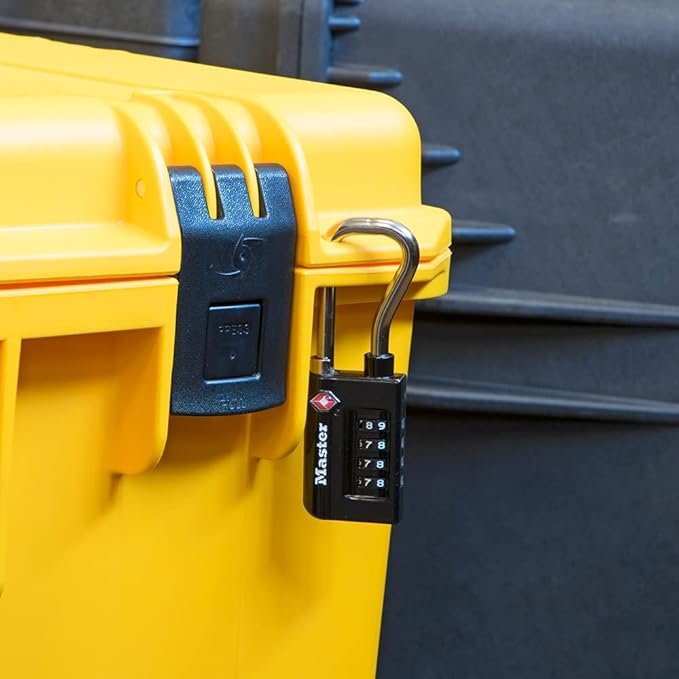
- Our Top Pick: Master Lock 4696T – A dependable classic that’s a perfect fit for any traveler.
- Most Durable: Tumi Luggage Lock – Built tough for those who travel often.
- Best on a Budget: Forge Luggage Lock – An affordable and secure option that gets the job done.
- For the Tech-Savvy: Airbolt Smart Lock – A smart cable lock you can control from your phone.
- Family Favorite: Anvil TSA-Approved Luggage Lock – A great multi-pack to keep track of everyone’s bags.
- Easiest to Use: Talonport Keyless Locks – Card-operated for quick and easy access.
- Best for Traditionalists: Forge Dimple Key Luggage Lock – A padlock with a simple, secure key.
- For Extra Reach: Lewis N. Clark Cable Luggage Lock – The extra-long cable makes it versatile for a variety of needs.
The Best Travel Locks This Year
Without further ado, below are some of the best locks this year. We thought that breaking it down by type would make a little more sense and explain a few reasons why you should consider them on your list.
1. The Classic: TSA-Approved Cable Lock
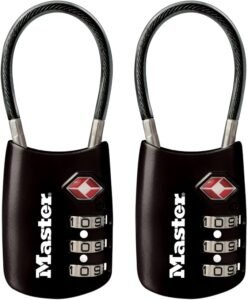
This is the most common travel lock for a reason. It’s simple, dependable, and, most of all, approved by the TSA. The flexible cable lets you secure multiple zippers on one bag or even lock your bag to a fixed object in a hostel or airport. Since it’s TSA-approved, airport security can open it with a master key instead of cutting it off.
2. The High-Tech Traveler: The Fingerprint Lock
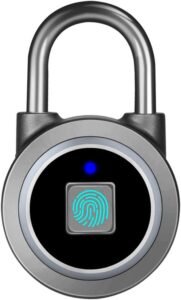
Tired of fumbling with keys or forgetting codes? A fingerprint lock is the perfect solution. These locks use your fingerprint to open, making them both secure and easy to use. Many models also include a backup key or code in case the battery dies.
3. The Lightweight Champion: The Retractable Cable Lock
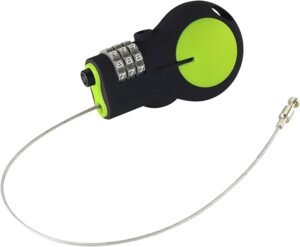
This lock is great for travelers who pack light. It’s tiny and has a steel cable that’s perfect for securing small items like daypacks or locking zippers on a carry-on. It’s a great deterrent for quick trips or for keeping your bag safe under a bus seat.
4. The Heavy-Duty: The Solid Body Padlock
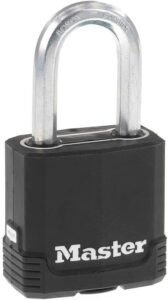
For the most security, go with a solid body padlock. Made from hardened steel, these are much tougher to break or cut. They are heavier than other locks, but they are ideal for checking expensive gear or for using in places where you need extra security. Just be sure to get a TSA-approved version.
5. The Multipurpose: The Dual-Function Lock
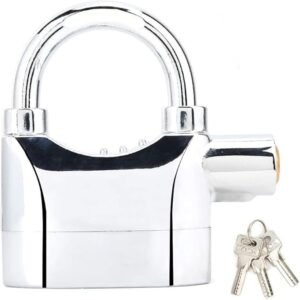
Some locks come with a built-in alarm. Look for ones with a motion-activated alarm that will sound if someone tries to mess with your bag. This is a great feature for hostel dorms or when you leave your bag alone for a short time.
6. The Anti-Theft Backpack with Built-in Lock
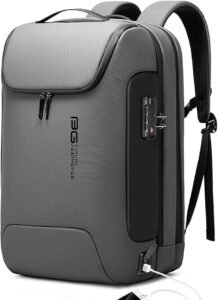
This isn’t just a lock—it’s a whole system. It’s the “I’m a little paranoid” pick. Many anti-theft backpacks now come with built-in locks. These bags often have hidden zippers, slash-proof material, and a lock that can secure the main compartments or the entire bag to a pole. It’s a great way to protect your belongings when exploring a city.
7. The “I Can’t Find My Keys” Lock: The Combination Lock
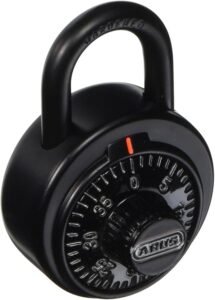
Simple and effective, the combination lock is a staple for a reason. You won’t lose any keys, and you can change the combination if you need to. Choose one with a strong body and dials that turn easily. TSA-approved versions are easy to find.
Which One Should You Buy?
The best lock for your trip really comes down to your travel habits. Here’s a simple guide to help you find the right one for you.
- If You Check a Bag: A TSA-Approved Cable Lock or a Solid Body Padlock is your best bet. A cable lock gives you the flexibility to secure multiple zippers, while a solid padlock offers a stronger physical barrier. Remember, for U.S. travel, a TSA-approved lock is a must. This allows airport security to open your bag for inspection without having to cut the lock.
- If You Only Bring a Carry-On: Go for a Retractable Cable Lock or a Dual-Function Lock. These are lightweight and perfect for securing a backpack to a table at an airport café. The added alarm on a dual-function lock gives you an extra layer of protection when you step away for a moment.
- If You’re a Tech-Savvy Traveler: A Fingerprint Lock offers a modern and secure solution. You’ll never have to worry about forgetting a code or losing a key, making it incredibly convenient for quick access.
- If You’re a Backpacker or Staying in Hostels: An Anti-Theft Backpack with a Built-in Lock is the ultimate choice. This provides a complete defense against theft, with slash-resistant material and an integrated lock to secure your belongings and the bag itself.
Remember, a lock’s main job is to be a deterrent. It’s meant to make your bag a less appealing target than the one next to it. While no lock is unbreakable, a good one shows potential thieves that your bag isn’t an easy target.
Travel Lock FAQs
Q: Do I need a TSA-approved lock?
A: If you are traveling to or from the United States and checking your luggage, yes. The TSA can open and inspect your bag. If you use a non-TSA lock, they might break it to get inside. With a TSA-approved lock, they have a master key that can open it without damage.
Q: Are travel locks really effective?
A: Travel locks are a deterrent. They are meant to stop quick, easy theft. Someone with the right tools can break any lock. A lock makes your bag a less attractive target and shows that your things aren’t easy to get to. It’s one part of a plan to protect your luggage.
Q: What if I forget the code to my lock?
A: Most combination locks can be reset. You can usually find instructions from the manufacturer online or with the lock itself. It’s always a good idea to write down your code somewhere safe, like in a password manager on your phone, and keep it separate from your luggage.
Q: Are fingerprint locks safe?
A: Yes, fingerprint locks are very secure. Most modern models use advanced technology to recognize your unique fingerprint. Many also have a backup option, like a key or code, in case the battery dies or the scanner doesn’t work. They are a great choice for a mix of security and convenience.





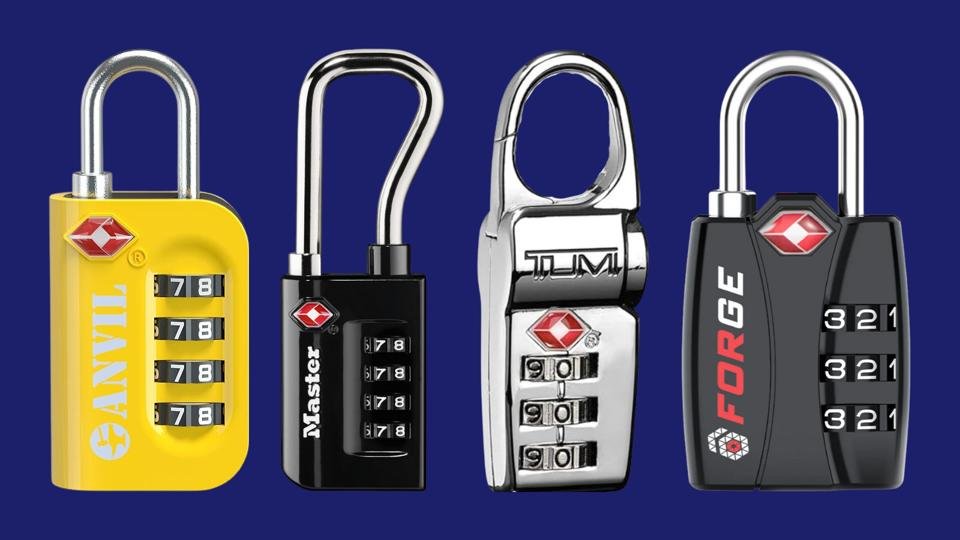




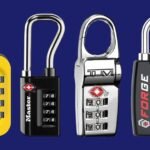
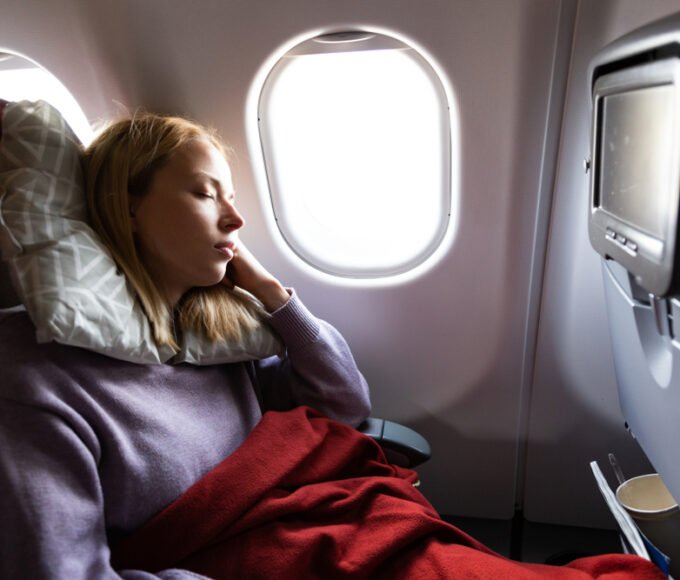



Leave a comment